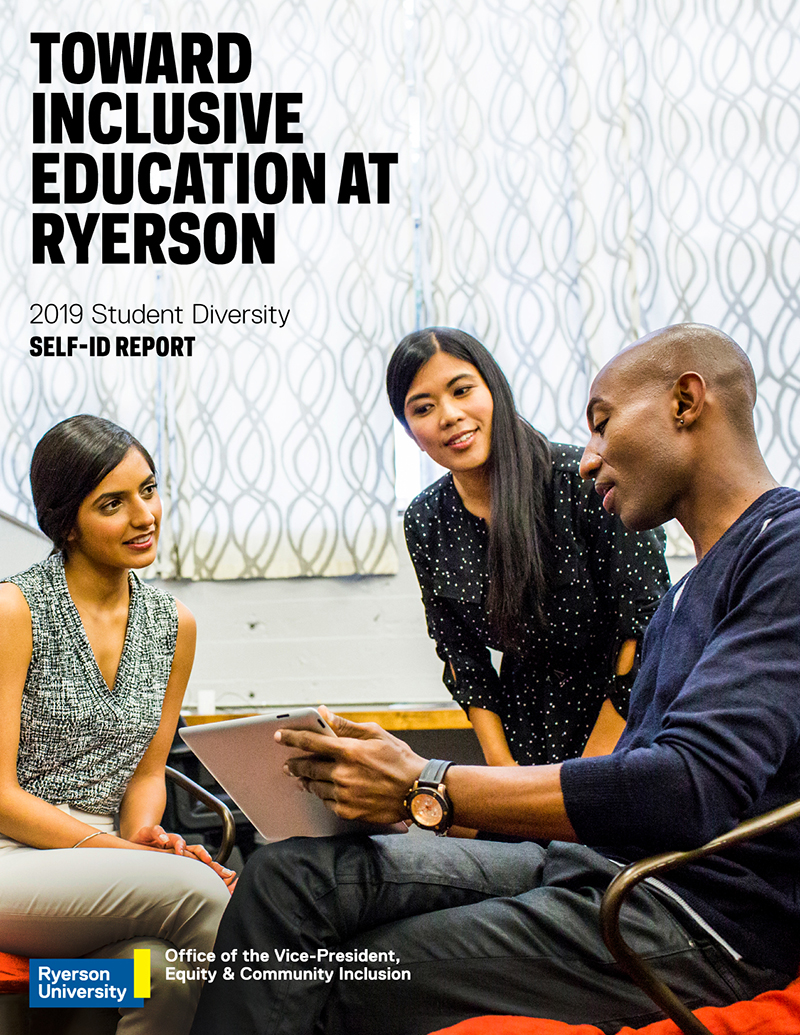2019 Student Diversity Self-ID Report
Toronto Metropolitan University’s 2019 Student Diversity Self-ID Report sets a baseline for representation of students from six equity-deserving groups: women, racialized people, Black people, First Nations, Inuit and Métis Peoples, persons with disabilities and 2SLGBTQ+ people.
It establishes our aspirational goal of reflecting the broader community in our student population, and the report card format encourages setting bold targets and initiatives to achieve this goal.
Reporting on student diversity self-identification data equips us to improve equity, diversity and inclusion, in terms of improved access to undergraduate and graduate programs and creating a campus that supports the success of all students.
Future reports will allow us to track our progress with expanding the representation of equity groups in undergraduate and graduate education, as well as in specific programs. They will also provide metrics on the success of students from equity and racialized groups, such as retention and graduation rates.
Sources for community data used to compare with student data
- Data for women and racialized people is from the 2016 Census data for the GTA.
- Data for Indigenous Peoples is from the 2016 Census data for Ontario.
- Data for persons with disabilities is from the 2017 Canadian Disability Survey for Ontario.
- Data for 2SLGBTQ+ people is from a 2001 Toronto Health Survey. There is no Census data for this group yet.
Understanding the data in the report
Student diversity data comes from students who have completed the university’s Student Diversity Self-ID questionnaire, which is part of the self-service functionality in MyServiceHub. Although the university requires that students complete the questionnaire, self-identification is voluntary, as there is a “prefer not to answer/opt out” option for every self-identification question.
Students are counted in every equity group they identify in and so may be counted more than once.
Every program receives a grade for the representation of each equity group and of the three largest racialized groups.
The A+ grade is assigned to programs that have representation at or above the community representation. A to D- grades are assigned by dividing the remaining programs into 11 groups from highest to lowest representation, with the top groups assigned to A, A-, B+, and so on and the groups with the lowest representation are assigned to D+, D or D-. All programs with zero representation of a group are assigned a D- grade automatically.
Once the grades are assigned for a program, a total diversity score is calculated by adding up the points assigned for each grade and dividing by eight (the five equity groups plus three racialized groups assigned a grade) to find the average, represented as a percentage. Points are assigned for grades based on the university’s grade points used for calculating GPA for undergraduate students, as follows:
| A grade | Points | B grade | Points | C grade | Points | D grade | Points |
|---|---|---|---|---|---|---|---|
| A+ | 4.33 | B+ | 3.33 | C+ | 2.33 | D+ | 1.33 |
| A | 4.00 | B | 3.00 | C | 2.00 | D | 1.00 |
| A- | 3.67 | B- | 2.67 | C- | 1.67 | D- | 0.67 |
Faculty percentage grades are then calculated as an average of the program diversity scores.
The purpose of the report card is to illustrate the uneven representation of students from equity and racialized groups in undergraduate and graduate programs, within the context of the aspirational goal of reflecting the community in the student population.
- An A+ grade is assigned to programs that have representation at or above the community representation.
- Minus and plus grades are used to establish groupings with smaller ranges of representation, so that we can better track our progress over time by showing changes in grade levels.
- Programs with the same representation for a group, to two decimal places, are assigned the same grade. This also means that all programs with zero representation for a group are assigned a D- grade.
Questions?
If you have any questions about the Student Diversity Data Center or the Student Diversity Self-ID Program, contact Research, Planning and Assessment in the Office of the Vice-President, Equity and Community Inclusion at diversitydata@torontomu.ca.
